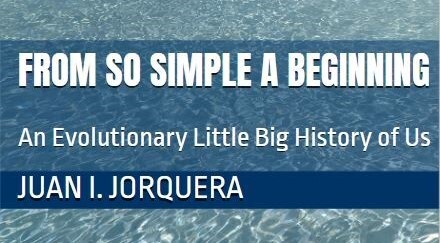
Good news, the first vaccine against the Chikungunya virus, "the disease that bends you", transmitted by the tiger mosquito, will soon be authorized.
https://jijorquera.wixsite.com/onscienceandsociety/post/progress-in-health-first-chikungunya-vaccine
#OnScienceAndSociety
Este es el último post de la serie sobre el futuro de la web "On Science and Society". Con él se finalizan los asuntos tratados en mi libro "De tan sencillo principio", disponible en Amazon. En próximas semanas continuaré publicando sobre noticias y asuntos relacionados con los contenidos de la web y el libro.
https://jijorquera.wixsite.com/onscienceandsociety/post/future-iii-our-dreams-will-finally-come-home-to-stay
#OnScienceAndSociety
This is the last post in the series on the future of the "On Science and Society" website. It concludes the issues dealt with in my book "De tan simple principio", available on Amazon. In the coming weeks I will continue to publish about news and issues related to the contents of the website and the book.
https://jijorquera.wixsite.com/onscienceandsociety/post/future-iii-our-dreams-will-finally-come-home-to-stay
#OnScienceAndSociety
This is the second post in the series about the future. I start with a quote from Edward O. Wilson: Scientific knowledge and technology double every one to two decades, depending on the discipline in which information is measured. This exponential growth makes the future impossible to predict beyond a decade, let alone centuries or millennia. Futurists are therefore prone to dwell upon those directions which, in their opinion, humanity should go. But given our miserable lack of self-understanding as a species, the better goal at this time may be to choose where not to go.
https://jijorquera.wixsite.com/onscienceandsociety/post/future-ii-and-sustainable-development-goals
#OnScienceAndSociety
Nuevo post sobre el futuro, con una cita de Edward O. Wilson: El conocimiento científico y la tecnología se duplican cada una o dos décadas, dependiendo de la disciplina en la que se mida la información. Este crecimiento exponencial hace que el futuro sea imposible de predecir más allá de una década, y mucho menos de siglos o milenios. Por lo tanto, los futuristas tienden a detenerse en aquellas direcciones que, en su opinión, la humanidad debería tomar. Pero dada nuestra miserable falta de autocomprensión como especie, el mejor objetivo en este momento puede ser elegir a dónde no ir.
https://jijorquera.wixsite.com/onscienceandsociety/post/future-ii-and-sustainable-development-goals
#OnScienceAndSociety
Big news in the journal Science: In a major analysis of a study performed in Africa, the first of two vaccines approved to fight malaria reduced deaths among young children by 13% in nearly four years, according to the World Health Organization (WHO). The vaccine also showed a 22% reduction in severe malaria in children who received a three-shot schedule.
https://www.science.org/content/article/first-malaria-vaccine-slashes-early-childhood-deaths
#OnScienceAndSociety
Una gran noticia en la revista Science: En un importante análisis de un estudio realizado en África, la primera de dos vacunas aprobadas para combatir la malaria redujo las muertes entre los menores pequeños en un 13% en casi 4 años, según la Organización Mundial de la Salud (OMS). La vacuna también mostró una reducción del 22% en la malaria grave en menores que recibieron una pauta de tres inyecciones.
https://www.science.org/content/article/first-malaria-vaccine-slashes-early-childhood-deaths
#OnScienceAndSociety
With this post I start a series on what to expect from the future and what we could do to ensure that such a future exists
https://jijorquera.wixsite.com/onscienceandsociety/post/future-i-respond-well-to-changes
#OnScienceAndSociety
Con este post empiezo una serie sobre lo que cabe esperar del futuro y qué podríamos hacer para garantizar que tal futuro existirá.
https://jijorquera.wixsite.com/onscienceandsociety/post/future-i-respond-well-to-changes
#OnScienceAndSociety
During these weeks, one of the most prestigious scientific journals, Nature, is publishing editorials and articles in which it analyzes the progress and shortcomings to be corrected in order to comply with the 2030 Agenda and the UN's Sustainable Development Goals (SDGs). This week I'm sharing an article that visually presents (see Nature’s link) the status and delays in meeting those goals.
https://www.nature.com/articles/d41586-023-02808-x
#OnScienceAndSociety
Image: Jakarta slumlife65. Jonathan McIntosh (thehero), CC BY 2.0 <https://creativecommons.org/licenses/by/2.0>, via Wikimedia Commons
Recientemente, una de las revistas científicas más prestigiosas, Nature, está publicando editoriales y artículos en los que analiza los avances y carencias a corregir para cumplir con la Agenda 2030 y los Objetivos de Desarrollo Sostenible (ODS) de la ONU. Esta semana comparto un artículo que presenta visualmente (ver el enlace de Nature) el estado y los retrasos en el cumplimiento de esas metas.
https://www.nature.com/articles/d41586-023-02808-x
#OnScienceAndSociety
Image: Jakarta slumlife65. Jonathan McIntosh (thehero), CC BY 2.0 <https://creativecommons.org/licenses/by/2.0>, via Wikimedia Commons
Good news for these depressing days. The WHO endorsed in early October the second available vaccine against malaria, which also seems to have greater availability than the previous one.
https://www.science.org/content/article/world-health-organization-endorses-much-anticipated-second-malaria-vaccine
#OnScienceAndSociety
Una buena noticia para estos días tan deprimentes. La OMS avaló a principios de octubre la segunda vacuna disponible contra la malaria, que además parece que tendrá mayor disponibilidad que la anterior.
https://www.science.org/content/article/world-health-organization-endorses-much-anticipated-second-malaria-vaccine
#OnScienceAndSociety
Este post, tercero sobre el asunto de la desigualdad económica extrema, cierra la serie sobre Progreso y Desigualdad, iniciada con el post sobre los Cuatro Jinetes del Apocalipsis.
https://jijorquera.wixsite.com/onscienceandsociety/post/extreme-economic-inequality-is-a-threat-to-democracy-ii
#onscienceandsociety
This post, third on the subject of extreme economic inequality, closes the series on Progress and Inequality initiated with the post on the Four Horsemen of the Apocalypse.
https://jijorquera.wixsite.com/onscienceandsociety/post/extreme-economic-inequality-is-a-threat-to-democracy-ii
#OnScienceAndSociety
I attach the link to the Nature editorial on the fourteenth UN Sustainable Development Goal (SDG): Life below water. Here's a short edited excerpt:
As the world warms, its oceans are acidifying: they've become 30% more acidic during the industrial age. The area covered by low-oxygen marine "dead zones," which are almost devoid of life, has more than quadrupled since 1960.
To get SDG 14 back on track by 2030, world leaders must deliver on the promises in their rhetoric.
https://www.nature.com/articles/d41586-023-02746-8
#OnScienceAndSociety
Adjunto el enlace al editorial de Nature sobre el decimocuarto Objetivo de Desarrollo Sostenible (ODS) de la ONU: Vida submarina. A continuación, un breve extracto editado:
A medida que el mundo se calienta, sus océanos se están acidificando: se han vuelto un 30% más ácidos durante la era industrial. El área cubierta por "zonas muertas" marinas con bajo contenido de oxígeno, que están casi desprovistas de vida, se ha más que cuadruplicado desde 1960.
Para volver a encarrilar el ODS 14 para 2030, los líderes mundiales deben cumplir las promesas en su retórica
https://www.nature.com/articles/d41586-023-02746-8
#OnScienceAndSociety
Very Well-deserved Nobel Prize for Katalin Karikó and Drew Weissman. For those who want to know a little more about the reason for the award, I share the post about the vaccine.
https://jijorquera.wixsite.com/onscienceandsociety/post/progress-iii-health-ii
#onscienceandsociety
Merecidísimo Premio Nobel para Katalin Karikó y Drew Weissman. Para los que quieran saber un poco más de la razón del premio, vuelvo a compartir el post sobre la vacuna para COVID - 19.
https://jijorquera.wixsite.com/onscienceandsociety/post/progress-iii-health-ii
#OnScienceAndSociety
This week's post is about the effect that progressive taxation had on reducing extreme economic inequality during the twentieth century and how neoliberal economic policy reversed this trend from the 1970s-1980s until now, resulting in the second period of greatest economic inequality in modern history.
https://jijorquera.wixsite.com/onscienceandsociety/post/extreme-inequality-ii
#OnScienceAndSociety
Ph.D in Biochemistry and Molecular Biology. About me: https://jijorquera.wixsite.com/onscienceandsociety
